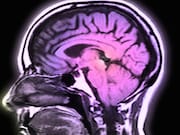Fewer enhancing lesions seen in weeks 12 to 24 for 75 mg evobrutinib once daily versus placebo
TUESDAY, May 14, 2019 (HealthDay News) — The selective Bruton’s tyrosine kinase (BTK) inhibitor evobrutinib at a dose of 75 mg once daily is associated with fewer enhancing lesions during weeks 12 through 24 among patients with relapsing multiple sclerosis, according to a study published May 10 in the New England Journal of Medicine to coincide with the annual meeting of the American Academy of Neurology, held from May 4 to 10 in Philadelphia.
Xavier Montalban, M.D., Ph.D., from the Vall d’Hebron University Hospital in Barcelona, Spain, and colleagues conducted a randomized phase 2 trial involving patients with relapsing multiple sclerosis. A total of 267 patients were randomly assigned to one of five groups: placebo, evobrutinib (at doses of 25 mg once daily, 75 mg once daily, or 75 mg twice daily), or open-label dimethyl fumarate (DMF).
The researchers found that the mean total number of gadolinium-enhancing lesions during weeks 12 through 24 was 3.85 ± 5.44, 4.06 ± 8.02, 1.69 ± 4.69, 1.15 ± 3.70, and 4.78 ± 22.05 in the placebo, evobrutinib 25 mg, evobrutinib 75 mg once daily, evobrutinib 75 mg twice daily, and DMF groups, respectively. Compared with placebo, the baseline adjusted rate ratios for the total number of lesions over time were 1.45 (95 percent confidence interval, 0.72 to 2.91; P = 0.32), 0.30 (95 percent confidence interval, 0.14 to 0.63; P = 0.005), and 0.44 (95 percent confidence interval, 0.21 to 0.93; P = 0.06) in the three evobrutinib groups, respectively.
“Biologic pathways involving activated B cells and myeloid cells play a role in multiple sclerosis, and BTK inhibition may alter these pathways,” the authors write.
Several authors disclosed ties to biopharmaceutical companies, including EMD Serono, which manufactures evobrutinib and supported the study.
Copyright © 2019 HealthDay. All rights reserved.








